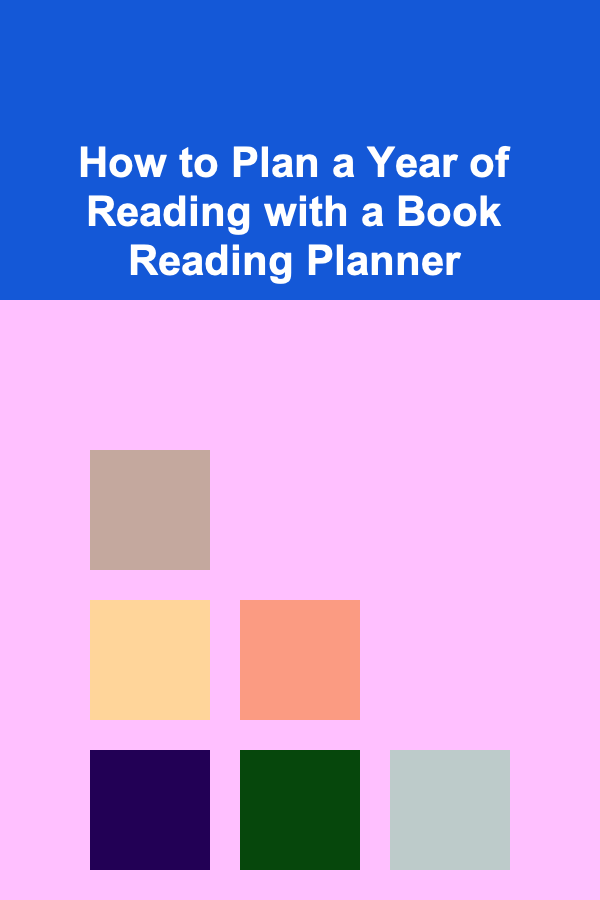
How to Plan a Year of Reading with a Book Reading Planner
ebook include PDF & Audio bundle (Micro Guide)
$12.99$9.99
Limited Time Offer! Order within the next:

Reading is one of the most rewarding activities you can engage in, offering both personal enrichment and intellectual growth. However, with the demands of daily life, it can sometimes feel challenging to keep track of your reading goals or make time for books amidst other responsibilities. One effective way to overcome this challenge is by planning your reading year with a book reading planner.
A book reading planner is not just a tool to track your progress but a strategic approach to making reading an intentional part of your life. Whether you're an avid reader looking to diversify your reading habits or someone who wants to read more consistently, a well-organized reading plan can help you set and achieve your reading goals, stay motivated, and find joy in the process.
In this article, we will explore how to plan a year of reading using a book reading planner. We will break down the process into manageable steps, offering practical tips on how to structure your reading plan, select books, and track your progress.
Define Your Reading Goals
Before diving into specific books, the first step in planning your reading year is to define your goals. This will guide your choices, helping you select books that align with what you want to achieve. Your goals should be clear, realistic, and measurable, as these qualities will help you stay motivated and focused throughout the year.
Types of Reading Goals:
- Set a Target Number of Books: Perhaps the most common reading goal is simply to read a specific number of books in a year. For instance, you might aim to read 50, 100, or even 20 books. The number should reflect your lifestyle, available time, and reading habits.
- Diversify Your Reading Genres: If you're looking to expand your reading horizons, set a goal to read books from different genres. Challenge yourself to explore fiction, non-fiction, memoirs, biographies, self-help, history, fantasy, or poetry.
- Focus on Personal Development: If you want to enhance your skills, select books that focus on personal growth, self-help, or professional development. This might include topics like leadership, time management, creativity, and emotional intelligence.
- Read More Diverse Authors: Make it a goal to read more books by authors from different cultures, backgrounds, and perspectives. This can help broaden your worldview and deepen your understanding of different experiences.
- Read Classics or Must-Reads: You might want to revisit the great works of literature or tackle a list of "must-read" books that you've always wanted to explore. Your reading plan could focus on timeless classics or contemporary books that have shaped literary culture.
By outlining your reading goals at the start of the year, you ensure that your reading journey is purposeful and aligned with your personal and intellectual growth.
Create a Reading List
Once you've defined your goals, it's time to create a list of books to read. This is where the fun begins --- curating a list of books that both excites and challenges you.
How to Curate Your Reading List:
- Use Recommendations: Seek out book recommendations from various sources such as friends, social media platforms (like Goodreads or Instagram), book clubs, and literary awards. Look for books that are highly rated or have sparked interesting discussions.
- Consider Personal Interests: Your list should include books that resonate with your personal interests or challenges. If you're passionate about a particular topic (e.g., history, technology, mental health, or environmental issues), make sure to include books related to that topic.
- Balance Between Genres: A balanced reading list can keep things fresh and engaging. Consider alternating between fiction and non-fiction, or reading lighter books and heavier ones. This variety will help prevent burnout and keep your reading journey exciting.
- Set Themes for Each Month: One creative approach is to assign themes to each month of the year. For example, January could focus on self-improvement, while March could focus on mystery novels. This can help you structure your reading year and keep things interesting.
- Leave Room for Spontaneity: While it's important to have a list, you shouldn't be too rigid. Leave space in your planner for new books that you discover throughout the year. This allows you to stay flexible and open to unexpected recommendations.
Once you've curated your list, be sure to prioritize the books that matter most to you while leaving room for variety and flexibility.
Organize Your Reading Schedule
Now that you have your reading list, it's time to organize your schedule. The key to successfully completing your reading goals is consistency. Creating a reading schedule helps you make time for books, ensuring that reading becomes a regular part of your daily or weekly routine.
How to Structure Your Reading Time:
- Set Realistic Time Slots: Start by allocating specific times during your day or week for reading. For example, you could set aside 30 minutes before bed or an hour during lunch breaks. The key is consistency, so try to make reading a habit.
- Track Daily or Weekly Progress: Consider setting a goal for how many pages or chapters you want to read each day or week. This could be as simple as reading 20 pages a day or finishing one chapter a day.
- Use a Timer: If you tend to get distracted or find yourself losing track of time, use a timer to commit to focused reading sessions. For example, read for 25 minutes, then take a 5-minute break. This method can help you maintain concentration and avoid burnout.
- Track Your Time: Use your reading planner to note how much time you spend reading each day or week. This helps keep you accountable and ensures you are making steady progress toward your reading goals.
Having a structured reading schedule ensures that you don't put your reading goals aside. Consistent progress, no matter how small, will help you stay on track throughout the year.
Track Your Progress with a Reading Tracker
Tracking your progress is one of the most rewarding aspects of using a reading planner. It allows you to see how much you've accomplished and provides the motivation to keep going. You can track progress in various ways, such as through a written log or digital tools.
How to Track Progress:
- Use a Reading Tracker: This could be a section in your reading planner or a separate journal. For each book, record details like the title, author, start and finish dates, and a short review or rating.
- Set Milestones: Break your year into smaller milestones, such as reading 10 books by the end of March or finishing a specific genre by the end of the summer. These mini-goals can help you stay motivated and give you a sense of accomplishment.
- Create a Visual Progress Chart: Some readers enjoy using charts or visual trackers. You could draw a simple bar graph or use colored markers to track the number of books or pages you've completed.
- Celebrate Milestones: Whenever you complete a book or reach a milestone, take a moment to celebrate your success. This could be as simple as writing a reflection about what you learned or discussing the book with a friend.
Tracking your progress helps you stay engaged with your reading goals, providing a visual representation of your accomplishments and motivating you to keep going.
Reflect on What You've Read
Reflection is an important part of the reading process. While it's great to read many books, the true value of reading lies in what you take away from each experience. Regular reflection helps you internalize the lessons and insights from each book, allowing you to apply them to your personal and professional life.
How to Reflect on Your Reading:
- Write Reviews or Journal Entries: After finishing each book, take time to write a brief review or personal journal entry. Reflect on the key themes, ideas, or concepts that stood out to you and how the book impacted you.
- Create a Book Summary: For each book, summarize the main points, plot, or characters. This not only helps you remember the key takeaways but also reinforces what you've learned.
- Join a Book Club or Discussion Group: Engage with other readers to share your thoughts on the book. Discussing books with others can offer new perspectives and deepen your understanding of the material.
Reflection ensures that your reading is purposeful and enriching, transforming your reading habit into a powerful tool for personal growth.
Adjust Your Plan as Needed
No plan is set in stone. Life can sometimes get in the way, and your reading habits or preferences may evolve throughout the year. Be prepared to adjust your reading plan as needed to fit your changing circumstances.
How to Adjust Your Reading Plan:
- Be Flexible: If you find that a certain genre or author isn't resonating with you, don't be afraid to switch it up. Adjust your goals and reading list to reflect your evolving interests.
- Change Your Reading Schedule: If you find that your initial reading schedule isn't working, adjust the time you dedicate to reading. You might need to read in shorter, more frequent sessions instead of long blocks.
- Revisit Your Goals: At the halfway point in the year, take time to review your progress. If you've already achieved certain goals, consider adding new challenges or extending your reading targets.
The beauty of using a reading planner is that it's customizable. If something isn't working, you have the flexibility to modify your plan and continue progressing toward your goals.
Enjoy the Journey
Finally, remember that reading is meant to be an enjoyable experience. While it's important to have goals and a plan, don't let the pressure to meet deadlines or track numbers take away from the enjoyment of reading. Books are meant to be savored, not rushed. Embrace the process and appreciate the knowledge, entertainment, and personal growth that each book brings.
How to Enjoy Your Reading Journey:
- Choose Books You're Excited About: Don't just read books for the sake of ticking them off your list. Make sure that your reading list is filled with books that genuinely excite you and spark your curiosity.
- Read for Pleasure, Not Just Progress: Sometimes, it's okay to take a break from your plan and just read something for fun. Reading shouldn't feel like a chore or a race against time.
- Celebrate Your Love for Reading: Celebrate the joy of reading by discussing books with friends, visiting local bookstores, or participating in reading challenges.
Reading is an enriching experience that offers countless benefits, from expanding your knowledge to offering new perspectives. By planning your year of reading with a book reading planner, you set yourself up for a successful, fulfilling, and enjoyable reading journey. With a little organization and thoughtful reflection, you can make reading a meaningful and consistent part of your life.
Reading More From Our Other Websites
- [Home Space Saving 101] How to Downsize Your Possessions for a More Spacious Home
- [Rock Climbing Tip 101] Essential Training Tips to Boost Your Climbing Fitness
- [Home Budget 101] How to Make the Most of Your Home's Square Footage on a Budget
- [Home Storage Solution 101] How to Build Your Own DIY Closet Organizer
- [Organization Tip 101] Mixing Styles: The Art of Eclectic Home Decorating
- [Mindful Eating Tip 101] From Plate to Presence: A Week‑Long Mindful Eating Dinner Plan for Busy Professionals
- [Personal Care Tips 101] How to Apply Mascara Without Getting It on Your Eyelids
- [Star Gazing Tip 101] Essential Tips for Setting Up and Using a Beginner Telescope
- [Home Storage Solution 101] How to Store Your Wine Collection Without Taking Up Space
- [Organization Tip 101] Tips for Efficient Tile Removal with Minimal Damage to Walls

How to Find the Best In-Home Dog Care for Special Needs Pets
Read More
How to Protect Your Home from Carbon Monoxide and Smoke Hazards
Read More
How to Stage Your Home to Sell as a Luxury Property
Read More
How To Brew Fruit Beers and Spiced Ales
Read More
How To Practice Amor Fati: Loving Your Fate
Read More
10 Tips for Cruise Cabin Organization: A Packing Checklist
Read MoreOther Products

How to Find the Best In-Home Dog Care for Special Needs Pets
Read More
How to Protect Your Home from Carbon Monoxide and Smoke Hazards
Read More
How to Stage Your Home to Sell as a Luxury Property
Read More
How To Brew Fruit Beers and Spiced Ales
Read More
How To Practice Amor Fati: Loving Your Fate
Read More